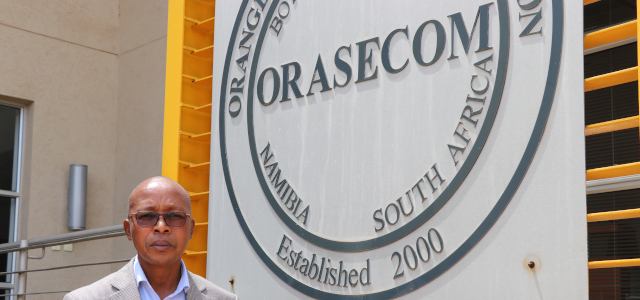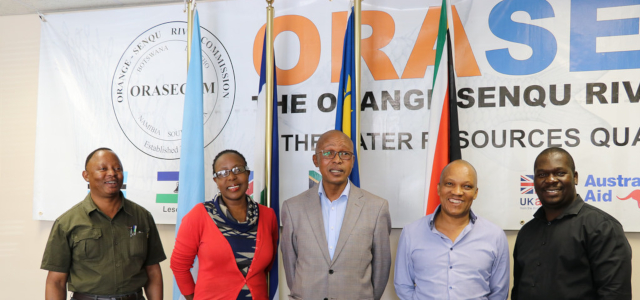The Orange Senqu River Commission (ORASECOM)’s 10-year basin-wide Integrated Water Resources Management (IWRM) Plan (2015-2024) was developed in order to contribute towards socio-economic upliftment of communities within the basin, and ensure future water security for the basin States.
The Plan was developed with the objective of providing a framework for sustainable development and management of the water resources, taking into account the need for improved distribution and equitable allocation of benefits.
“Following the consolidation and finalisation of the IWRM plan in 2014, an opportunity to add an additional lens to look into the plan was identified. It became apparent to assess the IWRM plan from a climate resilience and investors perspective, hence prompting the development of a project called, “Preparation of Climate Resilient Water Resources Investment Strategy and Multipurpose Project for the Orange-Senqu River Basin". The main objective of this project is to promote sustainable socio-economic growth in the basin riparian countries through climate resilient water resources development in the framework of basin-wide cooperation”, Said Mr Lenka Thamae, Executive Secretary, ORASECOM Secretariat.

Mr Lenka Thamae, Executive Secretary, The Orange-Senqu River Commission (ORASECOM) Secretariat
The Orange-Senqu River Basin is located in southern Africa, encompassing all of Lesotho, a large portion of South Africa, southern Namibia and southwestern Botswana. Supporting the livelihoods of over 14 million people living within and outside the basin, the Orange-Senqu River plays a major role in supporting various economic activities, among them; agriculture, industry, power generation and mining. The basin is a highly complex and integrated water resource system posing various water management challenges for safeguarding future water security. The central challenge being the assurance of water security under increased hydrological variability, compounded by impacts of climate change. The management of water resources in the basin is required to address these and other challenges. This project, therefore, provides part of the solution to the basin’s problems through optimisation of the water resources development based on balanced economic, social and environmental considerations.
The project will foster enhanced sustainable water resources management of the basin, increased investments based on better planning, allowing more multipurpose projects to address the livelihood needs of the communities living in rural and urban areas. The project, which will address the issues of climate change and water security among other challenges, is composed of:
I. Preparation of a Climate Resilient Water Resources Development Investment Strategy and Plan.
II. Transboundary Infrastructure Project Preparation - The Lesotho-Botswana Water Transfer Project.
III. Capacity Building and Stakeholders’ Consultation.
IV. Project Management.
The “Preparation of a Climate Resilient Water Resources Development Investment Strategy and Plan” looks at how the Commission’s interventions address impacts of climate change. Enhanced scientific information, climate forecasting, will be used to give indications of what climate change impacts the basin should anticipate and give recommendations regarding the adaptation of water infrastructure to climate change impacts in the process of managing the water resources within the basin. Overall, the investment plan will prioritise actions that will be implemented in the coming years to enhance climate resilience in water security in the orange Senqu river basin.
Another project within the Strategy is the “Transboundary Infrastructure Project Preparation - The Lesotho-Botswana Water Transfer Project”. The project involves the transfer of water from Lesotho to Botswana via South Africa. Given the challenges of water scarcity in some parts of the basin’s member states, which are aggravated by the hydrological developments and deteriorating environmental conditions within the basin, the project will be a huge milestone towards ensuring water security within the basin and its member states.
Mr. Thamae added that through the “Preparation of Climate Resilient Water Resources Investment Strategy and Multipurpose Project for the Orange-Senqu River Basin", ORASECOM will also, reinforce its capacity and institutional development, whilst at the same time strengthening cooperation and coordination between the Commission and its member states and partners as well as among the member states sharing the basin.
The Preparation of Climate Resilient Water Resources Investment Strategy and Multipurpose Project for the Orange-Senqu River Basin is funded by the African Water Facility (AWF) and New Partnership for Africa's Development Infrastructure Project Preparation Facility (NEPAD-IPPF ), GWPSA , the Climate Resilient Infrastructure Development Facility (CRIDF ), the Stockholm International Water Institute (SIWI) and other partners.
As a partner that has been involved in ORASECOM’s programming since the establishment of the Commission, GWPSA is supporting the ongoing development of the investment strategy. Part of this support includes engaging with stakeholders within riparian states through the Technical Task Team, capacity building, resource mobilisation as well as raising awareness around concepts such as climate resilience and investment planning development. GWPSA was also instrumental in the consolidation of the ORASECOM basin-level IWRM plan, where they raised awareness on IWRM as an approach for river basin management.
The Orange-Senqu River Commission (ORASECOM) was established by the governments of Botswana, Lesotho, Namibia and South Africa to promote equitable and sustainable development of the resources of the Orange-Senqu River. The joint commitment was sealed through the signing of the Agreement for the Establishment of the Orange-Senqu Commission on the 3rd of November, 2000 in Windhoek, Namibia, conforming with best international practices regarding the joint management of shared water rivers. The Commission, which is responsible for managing the resources of the Orange-Senqu River basin, is there to advise the riparian states and provide recommendations on the protection, preservation and management of the resources of the river basin. ORASECOM also provides a forum for consultation and coordination between the riparian states to promote integrated water resources management and development within the basin.
